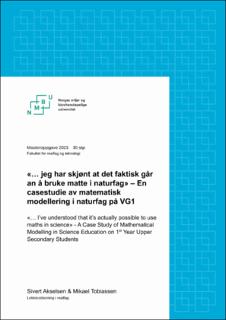| dc.contributor.advisor | Tonje Tomine Seland Strat | |
| dc.contributor.advisor | Margrethe Naalsund | |
| dc.contributor.author | Akselsen, Sivert | |
| dc.contributor.author | Tobiassen, Mikael | |
| dc.date.accessioned | 2023-07-06T16:27:44Z | |
| dc.date.available | 2023-07-06T16:27:44Z | |
| dc.date.issued | 2023 | |
| dc.identifier | no.nmbu:wiseflow:6839563:54592145 | |
| dc.identifier.uri | https://hdl.handle.net/11250/3076756 | |
| dc.description.abstract | Skolen har som oppdrag å utdanne mennesker som skal møte en fremtid under stadig endring. For å lykkes med en slik oppgave vil fremtidens borgere ha bruk for det man i samtiden kaller ferdigheter for det 21. århundret. Enkelte av disse ferdighetene kan trenes ved bruk av matematisk modellering, noe LK20 prøver å legge opp til. Vi har i denne studien valgt å undersøke om elevenes modelleringskompetanse har noe å si for deres opplevde forståelse av naturfagfenomenet halveringstid og hvilke holdninger elevene uttrykker etter et slikt opplegg. Studien har tatt form som en integrert enkeltcase studie, der vi har undersøkt elevgruppers modelleringskompetanse og enkeltelevers opplevde forståelse og uttrykte holdninger. Gjennom konstruksjon og bearbeidelse av et undervisningsopplegg, har vi utført en undervisning i en naturfagklasse på VG1, med 20 elever til stede, over to økter. Elevene har arbeidet i grupper og levert inn et elevprodukt, som har blitt analysert gjennom et videreutviklet analyseverktøy, tilpasset matematisk modellering i naturfag, som brukes til å vurdere elevenes modelleringskompetanse. I slutten av den siste økten har elevene besvart et semistrukturert spørreskjema, som er blitt analysert statistisk og med en induktiv innholdsanalyse, og danner datagrunnlaget for forståelsen og holdningene elevene uttrykker. Gjennom studien finner vi at elevenes modelleringskompetanse har en innvirkning på den opplevde forståelsen elevene uttrykker. Den delkompetansen i modelleringssyklusen det kan virke som har størst innvirkning på elevenes opplevde forståelse er å jobbe med matematikken og inneha den matematiske forståelsen som skal til for å oppnå nivået utøvende modelleringskompetanse. I tillegg finner vi at elevene uttrykker en generell positiv holdning i klassen mot en matematisk modelleringsaktivitet. De fleste elevene rapporterer at de opplever matematikken som nyttig og at de hadde en positiv opplevelse av aktiviteten. I diskusjonen finner vi flere uttrykte problemer elevene opplevde under undervisningsopplegget, som knyttes til ferdigheter elevene skal inneha ifølge LK20 – deriblant ferdigheter knyttet til programmering. Vi konkluderer med at det bør utøves videre forskning på området matematisk modellering i naturfag, særlig med tanke på at fremtidige elever vil ha andre forkunnskaper tilknyttet modellering ved kun å ha hatt LK20 som sin læreplan. | |
| dc.description.abstract | The primary objective of educational institutions is to educate people to possess the skills required to handle a future in constant change. To succeed in such a task, future citizens will require what is known as the skills of the 21st century. Some of these skills can be exercised through mathematical modelling, which the new Norwegian curriculum Kunnskapsløftet 2020 attempts to facilitate. In our study, we’ve chosen to examine if there’s a connection between students’ modelling competency and their expressed understanding of the scientific phenomenon half-life, and the expressed attitudes by these students, towards a mathematical modelling activity. Our study is designed as an integrated single case study, where we’ve assessed the modelling competency of the groups the students collaborated in, and the understanding and attitude expressed by the individual students. The teaching lessons occurred in an upper secondary science classroom, with 20 students attending in two sessions. The students worked in groups and delivered their modelling work, which has been analyzed through an analytic tool, adjusted to mathematical modelling in science. The tool has been utilized to assess the groups’ modelling competency. At the end of the last lesson, the students were asked to answer a semi-structured survey. Some of the data has been analyzed statistically and other data has been analyzed through an inductive content analysis, which creates the foundation of the data material of the students’ expressed understanding and attitudes. Throughout our study, we find students’ modelling competency has an impact on their expressed understanding. Students tend to express greater understanding when they have achieved the sub-competency that is related to working with mathematics and possess the mathematical understanding required to achieve the level utøvende modelleringskompetanse. We find that our students, in general, express a positive attitude towards such a learning activity. Most report that they find mathematics useful, and that the activity was a positive experience. Further we find that students tend to experience different problems related to this learning activity, that are related to skills in the new curriculum currently not fostered in students at upper secondary school – such as programming skills. We conclude our study by suggesting other areas for future research on mathematical modelling in science education. A point of interest for further study should be to study future students who should possess the necessary knowledge emphasized by the new curriculum. | |
| dc.language | nob | |
| dc.publisher | Norwegian University of Life Sciences | |
| dc.title | «… jeg har skjønt at det faktisk går an å bruke matte i naturfag» – En casestudie av matematisk modellering i naturfag på VG1 | |
| dc.type | Master thesis | |
